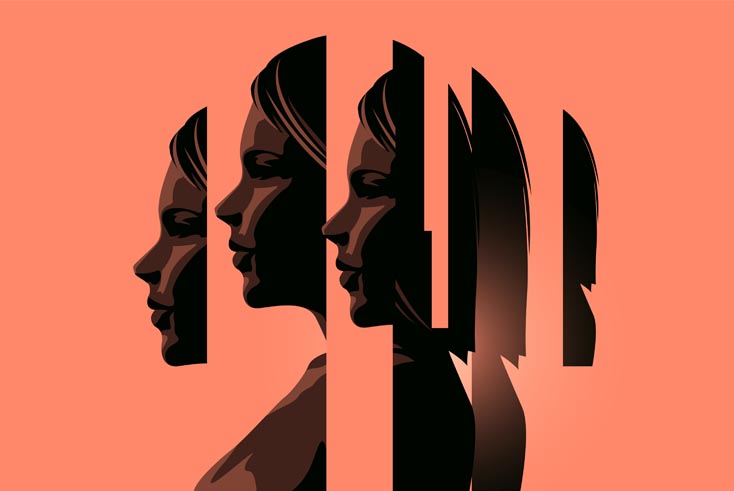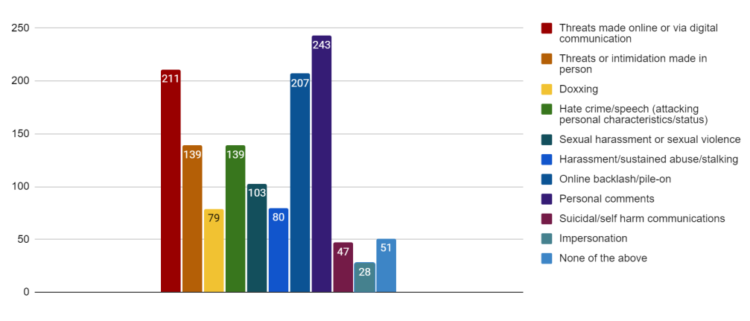Three-quarters of women journalists ‘experienced threat to safety’

Three-quarters of women journalists have experienced a threat or challenge to their safety in person or online during the course of their work.
That is according to a new survey conducted by Women in Journalism and Reach, which found that a quarter of participants said they had experienced some kind of sexual harassment or sexual violence in connection to their work.
A fifth of respondents also said they had been subjected to harassment, sustained abuse, or stalking in connection to their work.
The survey, which was conducted between late January and early February and received 403 participants across the industry, was released to coincide with International Women’s Day.
Concerns over online harms were found to be common; almost half of respondents said they promoted their work less online due to threats of online harm, and nearly a fifth of respondents said the threat of online harm had made them consider leaving the media industry altogether.
Various types of harms were experienced by a great number of respondents, with the most common being grouped as “personal comments” followed by “threats made online or via digital communication” and “online backlash/pile-on”.
Online harm was experienced primarily on Twitter (60% of respondents), Facebook (44% of respondents), and via email (43% of respondents).
Alison Phillips, chair of Women in Journalism and editor-in-chief of the Mirror, reflected on the report, saying: “Women have fought a long and hard battle to be seen and heard in journalism and over recent years we’ve seen many encouraging signs that this is beginning to pay off, with more women entering journalism and taking up leadership roles.
“However, these disturbing new findings show that we have a new fight on our hands — against those who try to silence us with online abuse and threats of sexual violence. Worryingly, the resulting toll on mental health and fear for physical safety indicates that a fifth of women in journalism have considered leaving the industry altogether. Without clear and coordinated action, there is a very real danger that the perpetrators will effectively silence women from playing an active part in the media.”
Reported harms were commonly gendered, with almost half of respondents saying they had experienced misogyny or harm connected to their gender or gender identity.
Freelancers felt particularly unsupported in tackling concerns over harassment or abuse; only a third of freelance participants expressed confidence in finding help or knowing what to do in the case of experiencing online harm, compared to more than 60% of permanently contracted journalists.
“This research confirmed what we sadly suspected — online abuse and harassment of women working in journalism and media in the UK is extensive,” said Dr Rebecca Whittington, online safety editor and co-chair of Reach Equality. “What is shocking though is the impact this is having on women’s careers and the hugely damaging impact that the potential exodus of women working in public-facing journalistic roles would have on equality and diversity within industry.
“Online harms are still being dismissed as being ‘part of the job’ and women in the industry are being frightened into silence. We must see this issue addressed firmly, consistently and transparently by platforms, police and employers if we want to continue to make journalism and media an industry where women want to work and thrive.”
Face the truth: women are still being edited out of the media industry
The findings of the survey were discussed at a live event today with Phillips, Dr Whittington, columnist Yamin Alibhai-Brown and LBC host Sangita Myska, where Women in Journalism revealed a call to action to “#stopsilencingwomenjournos”.
At the event, Myska described receiving death threats for her work, leading her to consider leaving her job or self-censoring to avoid hate or threats. Alibhai-Brown admitted “the last five years have made me want to give up, and I almost did a year ago when it got so intolerable.”
Women in Journalism is asking publishers and organisations to create an online harms policy designed to support all staff, including freelancers and those on temporary contracts, and to identify a permanent staff member to act as a leader in connection to online harms.
The organisation is pledging to provide support by creating a policy template and a list of up-to-date, free-to-use, reliable resources which organisations and freelancers can use to find support in connection to online harms. Women in Journalism will also help to identify training opportunities for managers in connection to online harms and connected issues such as mental health and welfare.





